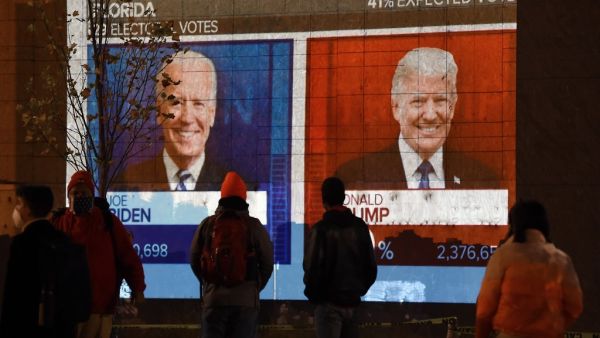Opinion pollsters have once again proved badly wrong in the US Presidential election, four years after Hillary Clinton was widely predicted to win and lost.
Polls held just before election day this time around gave Biden an average lead of ten points nationally, and narrower leads in swing states which all-but evaporated on the day itself.
Among the most inaccurate, were an ABC-Washington Post poll that gave Biden a 17-point lead in Wisconsin, a state where he is now tied with Trump with 49.3 per cent of the vote to 49 per cent.
A Quinnipac poll gave Biden a five point lead over Trump in Florida and four point lead in Ohio. In the end, Trump won both - by three and eight points, respectively.
As happened in 2016, Donald Trump appeared to have been helped by 'shy' voters who turned out on election day but were not willing to admit who they were voting for ahead of time.
Many experts and Trump supporters blamed the polling error an increasingly unwillingness on behalf of the public to declare their support for conservative candidates.
Steve Hilton, Fox election analyst, said: 'It's been this relentless barrage of hatred toward President Trump and the complete assumption Biden was going to walk it.
'Because of the incredible degree of hate that's been directed to President Trump and his supporters by nearly all the media, you've got this situation... where people didn't necessarily want to admit to pollsters who they were supporting because it was socially embarrassing to do so.
'If all you hear day in and day out that Trump is an evil, racist monster, then it's going to make it less likely you admit to supporting him, including to pollsters.
'And they haven't really taken that into account at all.'
Mr Cameron was ousted from power after losing the UK's Brexit referendum, after pollsters predicted the Remain campaign would win.
Arie Kapteyn, a pollster who correctly called a Trump win in 2016, warned Politico ahead of election day that 'shy' Trump voters were likely to be key to the final result.
'In general—and certainly on the phone—people may still be a little hesitant to say to that they’re Trump voters,' he said.
Robert Cahaly, pollster for the Trafalgar Group who predicted a Trump win in 2016, added: 'In 2016, the worst being said about Trump voters is that they were “deplorable.”
'2020 is a whole different ballgame. It is worse this time—significantly worse.
'This year had more things where you can get punished for expressing an opinion outside the mainstream than almost any year I can think of in modern history.
'I’m finding that people are very hesitant [to share their preference for Trump], because now it’s not just being called “deplorable.”
'It’s people getting beat up for wearing the wrong hat, people getting harassed for having a sticker on their car. People just do not want to say anything.'
Cahaly pointed to the 2018 Florida governor's race as a recent example of how pollsters are still getting it wrong.
Most called in favor of his Democrat rival, Andrew Gillum. In fact, DeSantis won by a narrow margin.
On Fox News, host Tucker Carlson was also asking how pollsters got it so wrong.
'How do we screw it up? We, in effect, lied to people,' Carlson said on-air Tuesday night. 'How did that happen?'
Carlson raised the prospect, which has been widely suggested by other political observers, that many Trump supporters are afraid to reveal their voting preferences to pollsters.
'The most basic question the polls raise: Is this a free country? If you're afraid to express a political view in public — you could be fired for it, banished for it — is that a free society? The answer is, of course not,' Carlson said.
Recent polls from Emmerson and Quinnipiac also showed Texas as a toss-up between Trump and Biden, raising the prospect of a Democratic landslide if the historically red state flipped. But with 91 percent of votes reported, Trump held a commanding lead in the Lone Star state, six points ahead at 52.3 percent to 46.2 percent.
Across the country, battleground states such as North Carolina, Michigan and Wisconsin also showed Trump leading with partial results reported, raising the prospect that polls showing those states leaning toward Biden might have been flawed.
Carlson said that the 'obvious lesson' is that the media got it wrong.
'At some point we, the media, need to pause and ask ourselves serious questions about how we're thinking through what's going to happen and how we present it because our predictions affect outcomes, to some extent, and they also, of course, determine our credibility. People judge us based on our predictions,' Carlson said.
'Something really went wrong in the way we predicted a number of these races,' he said.
On the other hand, polls showing Biden leading in Arizona appeared to be confirmed on Election Day, after Fox News called the state for the Democrat with about three-quarters of the votes counted.
The final election forecast from data journalist Nate Silver's 538 website on Tuesday morning gave Biden an 89 percent chance of winning the election - though as midnight approached, a Biden landslide had yet to materialize.
For Biden's boosters, the early returns raised the frightful prospect of a repeat of 2016, when most polls showed a commanding lead for Democrat Hillary Clinton that failed to materialize when the votes were tallied.
Similarly, polls in the UK predicted a decisive vote against Brexit in 2016, but were proven wrong by voters.
Among those suggesting that the Trump's prospects are being understated is Robert Cahaly of The Trafalgar Group, one of the only nonpartisan outlets that predicted a Republican victory in 2016 after finding that Trump was leading in the key battleground states of Michigan and Pennsylvania.
This year Trafalgar's analysis in the final days leading up to the election found a small lead for Trump in both of those states, contradicting nearly every other major poll.
In the last presidential election, the polling industry faced embarrassment after projections vastly underrated Trump's chances at winning.
Cahaly said its 'quite possible' that the same will happen in 2020, again because a hidden Trump vote was overlooked.
'There are more [shy Trump voters] than last time and it's not even a contest,' Cahaly told The Hill on Monday.
Susquehanna Polling and Research has also promoted the hidden Trump voter theory, as its most recent survey put Trump and Biden neck and neck in Wisconsin and gave the president a four-point lead in Florida.
'There are a lot of voters out there that don't want to admit they are voting for a guy that has been called a racist,' Susquehanna analyst Jim Lee told WFMZ this week.
'That submerged Trump factor is very real. We have been able to capture it and I'm really disappointed others have not.'
But many pollsters have rejected the idea that Trump voters are hiding, in part by disputing the reliability of Trafalgar's polling methods.
'[Trafalgar] doesn't disclose their 'proprietary digital methods' so I can't really evaluate what they're doing,' Jon McHenry, a Republican pollster with North Star Opinion Research, told The Hill.
'They're far enough out on a limb that a year from now, we'll all remember if they were very right or very wrong.'
'Something really went wrong in the way we predicted a number of these races,' he said.
On the other hand, polls showing Biden leading in Arizona appeared to be confirmed on Election Day, after Fox News called the state for the Democrat with about three-quarters of the votes counted.
The final election forecast from data journalist Nate Silver's 538 website on Tuesday morning gave Biden an 89 percent chance of winning the election - though as midnight approached, a Biden landslide had yet to materialize.
For Biden's boosters, the early returns raised the frightful prospect of a repeat of 2016, when most polls showed a commanding lead for Democrat Hillary Clinton that failed to materialize when the votes were tallied.
Similarly, polls in the UK predicted a decisive vote against Brexit in 2016, but were proven wrong by voters.
Among those suggesting that the Trump's prospects are being understated is Robert Cahaly of The Trafalgar Group, one of the only nonpartisan outlets that predicted a Republican victory in 2016 after finding that Trump was leading in the key battleground states of Michigan and Pennsylvania.
This year Trafalgar's analysis in the final days leading up to the election found a small lead for Trump in both of those states, contradicting nearly every other major poll.
In the last presidential election, the polling industry faced embarrassment after projections vastly underrated Trump's chances at winning.
Cahaly said its 'quite possible' that the same will happen in 2020, again because a hidden Trump vote was overlooked.
'There are more [shy Trump voters] than last time and it's not even a contest,' Cahaly told The Hill on Monday.
Susquehanna Polling and Research has also promoted the hidden Trump voter theory, as its most recent survey put Trump and Biden neck and neck in Wisconsin and gave the president a four-point lead in Florida.
'There are a lot of voters out there that don't want to admit they are voting for a guy that has been called a racist,' Susquehanna analyst Jim Lee told WFMZ this week.
'That submerged Trump factor is very real. We have been able to capture it and I'm really disappointed others have not.'
But many pollsters have rejected the idea that Trump voters are hiding, in part by disputing the reliability of Trafalgar's polling methods.
'[Trafalgar] doesn't disclose their 'proprietary digital methods' so I can't really evaluate what they're doing,' Jon McHenry, a Republican pollster with North Star Opinion Research, told The Hill.
'They're far enough out on a limb that a year from now, we'll all remember if they were very right or very wrong.'
This article has been adapted from its original source.








